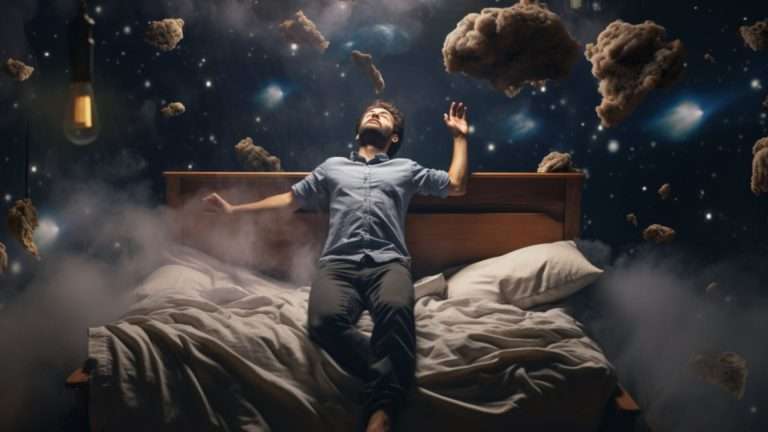Can Lucid Dreams Cause Sleep Paralysis? Explore the Connection
Some of our posts on Dreamtold.com contain affiliate links. If you click on an affiliate link and make a purchase, we may receive a commission. Clicking on an affiliate link that earns a commission does NOT result in additional charges or costs you extra. Earnings from affiliate links help keep this website running. See our full affiliate disclosure here.
Welcome to a fascinating exploration of the intriguing connection between lucid dreams and sleep paralysis. Both phenomena are common experiences for many people, yet their relationship is still widely debated among scientists and sleep researchers.
Have you ever woken up unable to move or speak, feeling a heavy weight on your chest, or sensing a presence in the room? This is a typical description of sleep paralysis, a temporary inability to move or speak during sleep-wake transitions. In contrast, lucid dreaming is the conscious awareness of dreaming while it’s happening, allowing you to control and manipulate your dreams to a certain extent.
Key Takeaways
- Lucid dreaming is the ability to be aware of and control your dreams while they are happening.
- Sleep paralysis is a temporary inability to move or speak during sleep-wake transitions.
- The connection between lucid dreams and sleep paralysis is still widely debated among sleep researchers.
What are Lucid Dreams?
If you’ve ever experienced a dream where you are fully aware that you are dreaming, then you have had a lucid dream. Unlike regular dreams, which often feel fragmented and out of our control, lucid dreams are characterized by a heightened sense of awareness and control over the dream experience.
During a lucid dream, individuals may have the ability to manipulate their surroundings, control the actions of dream characters, or even fly and perform other impossible feats. This state of heightened awareness during dreams is what sets lucid dreaming apart from regular dreaming.
There are several ways to induce lucid dreaming, including reality checks, keeping a dream journal, and practicing meditation and visualization techniques. Some individuals may also experience lucid dreams naturally, without any intentional effort.
Lucid dreams can be both exciting and enlightening experiences, providing individuals with a unique opportunity to explore their subconscious and fulfill their wildest dreams. However, they may also be associated with sleep disturbances, such as sleep paralysis.
Fun Fact: The concept of lucid dreaming has been around since ancient times, with references to lucid dreaming found in both the Hindu and Buddhist traditions.

Understanding Sleep Paralysis
Sleep paralysis is a sleep disorder that affects a significant number of individuals at some point in their lives. It occurs during the transition between sleep and wakefulness when the body is unable to move despite being conscious. This condition typically lasts for a few seconds to several minutes, but it can be distressing for those who experience it.
The symptoms of sleep paralysis include the inability to move, speak, or even breathe properly. The individual may also experience hallucinations, which can be visual, auditory, or tactile. These hallucinations are often disturbing and can add to the fear and distress of the episode.
While the exact cause of sleep paralysis is unknown, there are several factors that may contribute to its occurrence. These include disrupted sleep patterns, sleep deprivation, stress, anxiety, and certain medications.
The Relationship Between Lucid Dreams and Sleep Paralysis
Lucid dreaming and sleep paralysis are two fascinating sleep phenomena that have piqued the interest of researchers and individuals alike. But is there a connection between them?
Research has shown that individuals who frequently experience sleep paralysis are more likely also to experience lucid dreams. This suggests that there may be a relationship between the two phenomena.
The Connection
One theory is that the same neurotransmitters involved in regulating sleep and dreaming may play a role in both lucid dreaming and sleep paralysis. Additionally, some researchers believe that lucid dreaming may occur during the transition between sleep stages, which is when sleep paralysis typically occurs.
Many individuals have reported experiencing both lucid dreams and sleep paralysis, with some experiencing sleep paralysis directly after a lucid dream. These reports have sparked curiosity and debate in the scientific community, leading to studies and research exploring the relationship between the two phenomena.
However, it is important to note that not all individuals who experience lucid dreaming will also experience sleep paralysis. The relationship between the two is still not fully understood, and more research is needed to determine the extent of their connection.

Can Lucid Dreams Cause Sleep Paralysis?
Lucid dreaming can lead to sleep paralysis for some individuals. Several anecdotal accounts depict individuals experiencing sleep paralysis after practicing lucid dreaming techniques. However, scientific research on this phenomenon remains limited, and more studies are necessary to establish a clear connection between the two phenomena.
Some factors may increase the likelihood of experiencing sleep paralysis after practicing lucid dreaming. For example, the sleep schedule of the individual, the frequency and intensity of lucid dreams, and levels of stress and anxiety may contribute to the occurrence of sleep paralysis episodes.
During lucid dreaming, individuals may become aware of their surroundings and engage in dream control. However, this increased awareness may also lead to a more significant likelihood of experiencing sleep paralysis. Some individuals may become too immersed in their lucid dreams, leading to difficulties returning to reality and triggering sleep paralysis.
While some individuals may experience sleep paralysis after practicing lucid dream techniques, it is essential to note that not everyone who practices lucid dreaming will experience sleep paralysis. Managing stress levels, maintaining a regular sleep schedule, and seeking professional help, if necessary, can help individuals prevent or reduce the occurrence of sleep paralysis episodes linked to lucid dreaming.
The Effects of Lucid Dreaming on Sleep Paralysis
Lucid dreaming has been a topic of fascination for many years, with individuals seeking to explore and control their dreams. However, there is also a curious relationship between lucid dreaming and sleep paralysis that has caught the attention of researchers and dreamers alike.
Enhanced dream control and increased awareness during lucid dreams may have an impact on the occurrence and frequency of sleep paralysis episodes. One study found that individuals who regularly experienced lucid dreams reported lower rates of sleep paralysis compared to those who did not practice lucid dreaming.
On the other hand, some individuals have reported that the practice of lucid dreaming has actually led to the onset of sleep paralysis. The heightened state of awareness and control during lucid dreams may trigger the sensation of being awake but unable to move, leading to a sleep paralysis episode.
It’s important to note that the relationship between lucid dreaming and sleep paralysis is complex and may vary among individuals. While some may experience a decrease in sleep paralysis episodes with the practice of lucid dreaming, others may see an increase.
Overall, the effect of lucid dreaming on sleep paralysis is an area of ongoing research and exploration. Those who engage in lucid dreaming should be aware of the potential for sleep paralysis episodes and take steps to manage or cope with them, if they occur.

Sleep Paralysis Triggered by Lucid Dreaming
It is not uncommon for individuals to experience sleep paralysis after engaging in lucid dreaming practices. While the exact relationship between the two phenomena is not fully understood, anecdotal evidence and personal accounts suggest that lucid dreaming may trigger sleep paralysis in some individuals.
Some experts speculate that this may be due to the heightened level of awareness and control experienced during lucid dreaming. When an individual becomes aware that they are dreaming, they may attempt to exert too much control over the dream environment, leading to a state of hyperarousal that can trigger sleep paralysis. However, more research is needed to fully understand this phenomenon.
| Personal Account: | “I have been practicing lucid dreaming for several years and have experienced a few episodes of sleep paralysis. In my experience, the sleep paralysis seems to occur when I am trying too hard to control the dream. It’s frustrating, but I have learned to take a step back and let the dream unfold naturally.” |
|---|
In some cases, sleep paralysis triggered by lucid dreaming may be a sign of an underlying sleep disorder, such as narcolepsy. If an individual experiences frequent episodes of sleep paralysis or has other symptoms of a sleep disorder, they should consult a healthcare professional for evaluation and treatment.
Lucid Dreaming and Sleep Paralysis: A Complex Relationship
The relationship between lucid dreaming and sleep paralysis is a complex one that requires further investigation. While some individuals may experience sleep paralysis after engaging in lucid dreaming practices, others may not. It is important to approach these phenomena with an open mind and to be aware of the potential risks and benefits associated with each.

Managing Sleep Paralysis Associated with Lucid Dreams
If you experience sleep paralysis as a result of lucid dreaming, there are steps you can take to manage and reduce its impact on your sleep experience. Here are some tips:
- Relaxation techniques: Practice relaxation methods, such as deep breathing, meditation, or visualization, before going to bed or when you wake up during sleep paralysis to help calm your mind and body.
- Maintain a regular sleep schedule: Aim to go to bed and wake up at the same time every day to promote healthy sleep patterns. This can help reduce the frequency of sleep paralysis episodes.
- Talk to a healthcare professional: If your sleep paralysis is causing significant distress or affecting your quality of life, consider speaking with a medical or mental health professional for further evaluation and treatment options.
If you are experiencing distress from recurring sleep paralysis episodes, it is important to seek help and support. Remember that you are not alone in your experiences and that there are resources available to help you manage and cope with these phenomena.
Coping Strategies for Sleep Paralysis and Lucid Dreaming
If you experience sleep paralysis and engage in lucid dreaming, it is essential to develop coping strategies to manage these phenomena. Below are some tips and techniques that may help.
1. Relaxation Techniques
When you wake up and find yourself in a state of sleep paralysis, it’s essential to remain calm. Try tensing and relaxing your muscles or deep breathing exercises to promote relaxation of the body.
2. Maintain a Regular Sleep Schedule
Establishing a consistent sleep schedule can help minimize the occurrence of sleep paralysis episodes. A regular sleep schedule helps regulate the body’s natural sleep-wake cycle, which can reduce the likelihood of experiencing sleep paralysis.
3. Seek Professional Help if Necessary
If you experience frequent episodes of sleep paralysis or find it challenging to manage, consider seeking help from a professional. A sleep specialist or therapist can provide guidance and support to help you manage these phenomena.
4. Practice Mindfulness Techniques
Engaging in mindfulness techniques can help promote relaxation and manage stress levels, which may contribute to the occurrence of sleep paralysis episodes. Consider practicing meditation, yoga, or tai chi to promote relaxation and mindfulness.
5. Reality Checks
Practicing reality checks during the day can help you differentiate between dreaming and reality. Reality checks involve questioning the state of reality and determining whether you are dreaming or awake. Performing reality checks during the day can also help trigger lucid dreams.
6. Keep a Dream Journal
Keeping a dream journal can help you identify patterns and triggers that may contribute to the occurrence of sleep paralysis episodes. Recording dreams in a journal can also help promote awareness and control during lucid dreaming.
Remember, coping with sleep paralysis and lucid dreaming may take time and practice. Be patient with yourself and seek help if necessary.
Final Thoughts
The connection between lucid dreams and sleep paralysis continues to intrigue researchers and individuals alike. While there is no definitive answer to the question of whether lucid dreams can cause sleep paralysis, there are numerous personal accounts and scientific studies that suggest a potential link between the two phenomena.
It is important for individuals who experience both lucid dreaming and sleep paralysis to understand the characteristics of each and seek professional help if necessary. Coping strategies such as relaxation techniques, maintaining a regular sleep schedule, and keeping a dream journal can help manage the occurrence of sleep paralysis episodes and promote positive experiences during lucid dreams.
As with any sleep phenomena, more research is needed to understand the relationship between lucid dreaming and sleep paralysis fully. In the meantime, we encourage individuals to continue exploring the fascinating world of the sleeping mind and to seek support and guidance if they experience distress due to these phenomena.
Frequently Asked Questions About the Possibility of Lucid Dreams Causing Sleep Paralysis
Q: Can Lucid Dreams Cause Sleep Paralysis?
A: Lucid dreams and sleep paralysis are two distinct phenomena, but they can sometimes occur together. While it is not a direct cause-effect relationship, some individuals have reported experiencing sleep paralysis after engaging in lucid dreaming practices.
Q: What are Lucid Dreams?
A: Lucid dreams are dreams in which the dreamer is aware that they are dreaming. Unlike regular dreams, lucid dreams allow individuals to have a sense of control and awareness within the dream world. This heightened state of consciousness can lead to unique and vivid dream experiences.
Q: Understanding Sleep Paralysis
A: Sleep paralysis is a sleep disorder characterized by a temporary inability to move or speak while falling asleep or waking up. During sleep paralysis, individuals may feel awake yet unable to move their bodies. It is often accompanied by hallucinations and a sense of fear or unease.
Q: The Relationship Between Lucid Dreams and Sleep Paralysis
A: There is a curious connection between lucid dreams and sleep paralysis, as some individuals have reported experiencing both phenomena. While the exact relationship is still being explored, scientific studies and personal accounts suggest that there may be a link between these two experiences.
Q: Can Lucid Dreams Cause Sleep Paralysis?
A: While lucid dreams themselves do not directly cause sleep paralysis, some individuals have reported experiencing sleep paralysis after engaging in lucid dreaming practices. It is important to note that not everyone who practices lucid dreaming will experience sleep paralysis.
Q: The Effects of Lucid Dreaming on Sleep Paralysis
A: The impact of lucid dreaming on sleep paralysis is still not fully understood. However, some individuals have reported that increased awareness and control during lucid dreams may reduce the frequency or intensity of sleep paralysis episodes. Further research is needed to investigate these potential effects.
Q: Sleep Paralysis Triggered by Lucid Dreaming
A: There is anecdotal evidence suggesting that lucid dreaming can trigger sleep paralysis in some individuals. While the exact mechanisms behind this phenomenon are not clear, it may involve the disruption of normal sleep patterns or the transition between different stages of sleep.
Q: Managing Sleep Paralysis Associated with Lucid Dreams
A: If you experience sleep paralysis in conjunction with lucid dreaming, there are several strategies you can try to manage it. Relaxation techniques, maintaining a regular sleep schedule, and seeking professional help, if necessary, can all be beneficial in coping with sleep paralysis.
Q: Coping Strategies for Sleep Paralysis and Lucid Dreaming
A: For individuals who experience sleep paralysis and engage in lucid dreaming, coping strategies can help minimize the occurrence of sleep paralysis episodes. Mindfulness techniques, reality checks, and maintaining a dream journal can all contribute to a positive and manageable experience.
Q: Is there Anything Else I Should Know About Lucid dreaming and Sleep Paralysis?
There is an intriguing connection between lucid dreams and sleep paralysis. While the relationship between the two is still being explored, individuals have reported experiencing both phenomena. Further research is needed to fully understand the mechanisms and potential impact of lucid dreaming on sleep paralysis.

Hi, I’m Cal Hewitt, the founder of Dream Told. After battling insomnia for over 30 years, I’ve dedicated myself to helping others find natural, practical solutions for better sleep. Through extensive research and personal experience, I share insights on how to improve your sleep quality, from creating the right environment to using external tools like binaural audio. My goal is to educate, inspire, and provide real solutions for anyone looking to get more restful sleep. Explore more about my journey and how Dream Told can help you by visiting my full story below.






